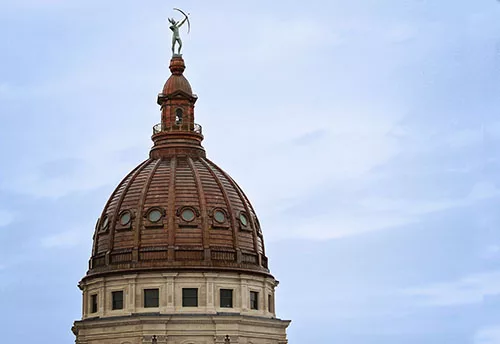Kansas Governor Laura Kelly has signed a bipartisan bill to allocate funding for the next four fiscal years, but she is raising concerns about a future deficit.
The bill will cover Fiscal Years 2025, 2026, 2027 and 2028, but the governor said “I remain concerned about the long-term fiscal impact this budget will have on our ability to invest in programs and services that Kansas families rely on, given that this budget will put the state in the red by Fiscal Year 2028. I am also concerned that the Legislature will adjourn before the release of Consensus Revenue Estimates, meaning we won’t fully understand the fiscal impact of this budget until after the Legislature has left town.”
The governor said despite those concerns, the budget contains funding that will improve state resources for Kansans. Some of the highlights:
- Invests in Kansas’ Water Quality and Quantity: Senate Bill 125 adds another $6 million annual investment to safeguard Kansas’ water supply. It includes $1.75 million to increase state matching dollars to local conservation districts, $1 million for sorghum research, and $3 million for a pilot project to manage sedimentation in the John Redmond Reservoir and secure that critical water source.
- Invests in Early Childhood and K-12 Education: The budget, as signed by Governor Kelly, fully funds K-12 education for a seventh consecutive year, providing additional funds for public schools across the state. Senate Bill 125 also invests an additional $10 million in special education state aid and $1.25 million to expand rural child care access.
- Advances Kansas’ Economy: The budget includes nearly $50 million to support Kansas’ aviation industry, providing opportunities to continue the state’s historic success in economic development. The budget also includes funding attract innovative businesses in the cybersecurity and biotechnology industries to Kansas. Additionally, it allocates $1 million for rural remote workplaces to support our rural workforce.
- Supports Higher Education: The budget includes more than $16 million to support student success and retention initiatives, more than $34 million in additional funding for community and technical colleges, and continues the state’s commitment to lowering costs for students through investments in need-based financial aid.
- Bolsters Intellectual and Developmental Disability Services Funding: The bill increases funding for the Intellectual and Developmental Disability (I/DD) waiver by allocating $14 million to offer services to 200 individuals and allocating $10.5 million to increase reimbursement rates for I/DD waiver providers in Fiscal Year 2026.







